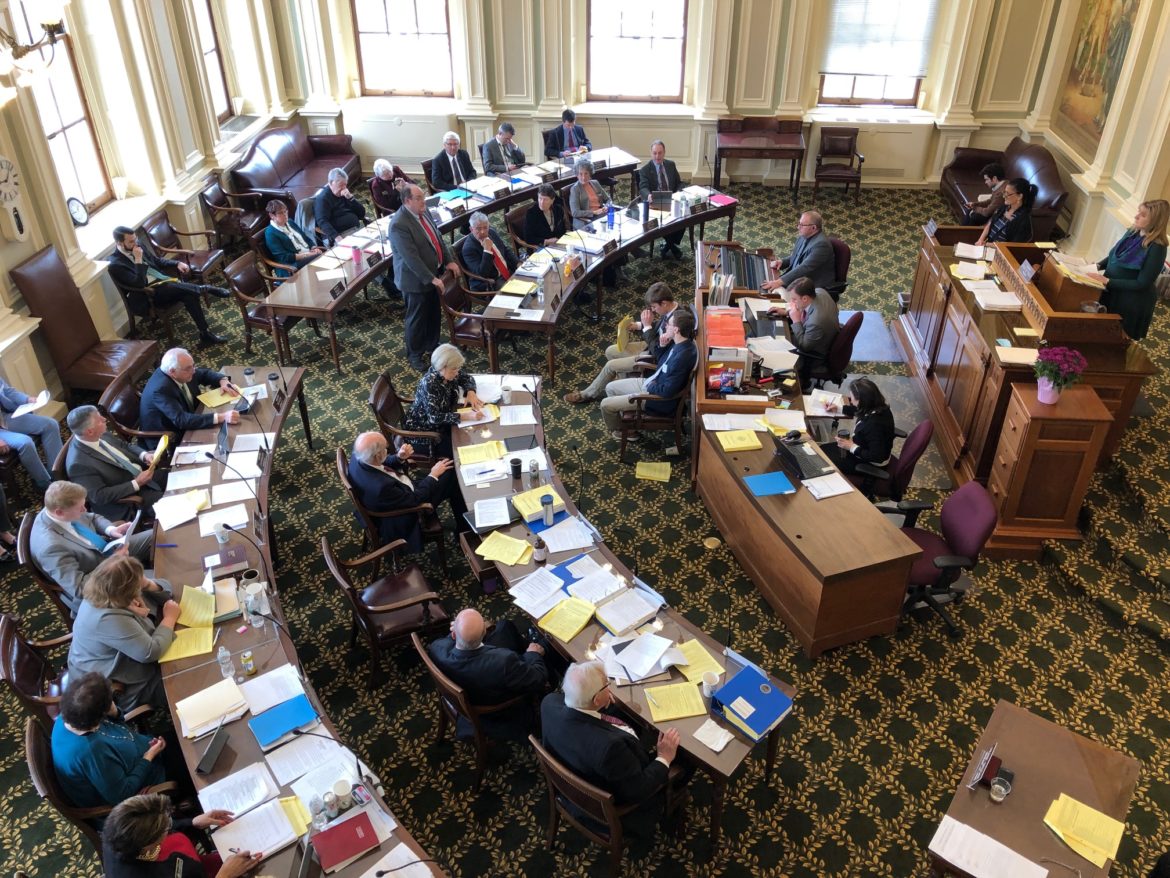By PAULA TRACY, InDepthNH.org
CONCORD – New Hampshire lawmakers voted on Thursday on legislation dealing with minimum wage, education funding, sexual harassment and more.
In the Senate while some bills were passed or killed along party lines, there was unanimous agreement on SB 266-FN, which would divert Keno revenues to school building aid.
The bill now goes to the Senate Finance committee.
Sen. David Watters, D-Dover, called it a step in the right direction toward fixing the state’s “broken education funding system.”
Senate Majority Leader Dan Feltes, D-Concord, said the vote was a “bipartisan rebuke to the state’s current system of kindergarten funding. It was an overwhelming message to the governor, who underfunds kindergarten in his budget once again, that the Senate wants to end the connection between kindergarten and Keno and finally treat kindergarten students as equal to every other grade in the state’s education funding calculations.”
Sexual harassment complaints
The Senate also unanimously passed SB 235, which would establish an independent human resources position to handle sexual harassment complaints against legislators.
Senate President Donna Soucy, D-Manchester, a co-sponsor, said creating the position would give the public and “our employees the confidence in the system they need to come forward without fear of retribution.”
Soucy said it is “beyond time to take sexual harassment in the State House seriously and I’m grateful to my Senate colleagues for unanimously supporting this common-sense measure.”
Amanda Grady Sexton, director of public affairs for the New Hampshire Coalition Against Domestic and Sexual Violence, added: “Today’s vote is a strong signal that the Senate acknowledges the inherent power dynamic in play and takes seriously its responsibility to foster a safe and healthy work environment for their employees and the public. We are grateful for the leadership of Senators Soucy, Feltes, and Hennessey for bringing this initiative forward.”
The Senate also passed Senate Bill 282, which would offer suicide prevention education in schools.
Sen. Lou D’Allesandro, D-Manchester, said suicide has been a problem in New Hampshire for a long time.
“The tragedy of suicide is so pervasive that you never recover from it,” D’Allesandro said, recalling how his son faced a young friend’s death.
“I think this is something we have really neglected for years and years,” he said. “It affects all aspects of society.”
Sen. Bob Giuda, R-Warren agreed. A student in his district committed suicide, he said, adding people in schools are “your best detection device.”
The Senate passed SB 292-FN. In January 2019, the NH Department of Health and Human Services released a 10-year plan to restore New Hampshire’s mental health system – the third of its kind in the past decade. The development of this most recent 10-year mental health plan involved all stakeholders, in a comprehensive manner, to address the mental health needs of New Hampshire children and adults alike.
This bill ensures its full and timely implementation.
The Senate voted 14-10 to pass SB 122, which requires the Public Utilities Commission to allocate all funds generated through the Regional Greenhouse Gas Initiative program to go to fund energy efficiency projects. SB 122 also redirects the allocation of the RGGI proceeds, requiring at least 35% of the funds to be spent on low-income utility core energy efficiency programs. Starting on January 1, 2020, up to $5,000,000 will be spent annually on municipal and school district energy efficiency programs. The bill now goes to the House.
In the House
See the rest of Thursday’s House action here.
The House of Representatives voted to increase the minimum wage on Thursday.
It would increase from $7.25 an hour to $9.50 in 2020 and to $12 in 2022. The vote was 210-145. House Bill 186 now heads to the state Senate.
New Hampshire has the lowest minimum wage in New England. New Hampshire defaults to the federal minimum wage and does not have its own. Massachusetts has a $12 minimum wage.
Supporters say $7.25 is not a living wage, while opponents say increasing the minimum wage would increase prices.
“This is about real families who deal with this every day,” said Rep. Kris Schultz, D-Concord, who supported an unsucessful amendment to make the minimum wage $15.
Rep. Brian Sullivan, D-Grantham, said the committee looked at three minimum wage bills and carefully chose to adopt House Bill 186, which limits the minimum wage to $12 an hour.
“It was a pragmatic choice,” he said. He urged the House to oppose the floor amendment Schultz advocated and it failed 274-79.
Rep. Max Abramson of Seabrook, a former Republican and Libertarian, said every time the federal government has increased wages, some businesses fail because they are unable to keep up with the increase.
Following the law of supply and demand is a better idea, he said.
House Republican Leader Dick Hinch issued a statement following the House vote on HB 186.
“So far this year, House Democrats have passed bills that signal to our small businesses that they want them to pay higher taxes, higher electric rates, and provide family leave insurance and have their employees pay a tax on their wages to pay for it. Now they want to tell them how much to pay their employees, even if it’s unsustainable. Where does it stop?” Hinch said.
“… State government should stop telling job creators how to run their businesses,” Hinch said.
In other action, the Senate voted to:
– Support a bill requiring health insurers to cover fertility treatment. (SB 279)
– Passed a bill to create a statewide school threat alert system. (SB 253)
– Passed funding for a pilot program to provide mental health services for schools (SB 281)
– Killed a separate bill requiring teacher training in suicide and anti-bullying prevention (SB 199)
– Increased money to the Land and Community Heritage Investment Program from registries of deeds. (SB 74)






